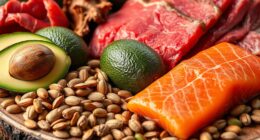According to recent findings, the raw food diet is becoming increasingly popular among those focused on their health. A survey revealed that 67% of Americans are interested in adding more raw foods to their meal plans (source).
The principles of the raw food diet revolve around consuming uncooked and unprocessed foods, such as fruits, vegetables, nuts, seeds, and grains. By avoiding cooking and heating, proponents of this diet believe that they can preserve the nutrients and enzymes in these foods, leading to improved health and vitality.
But what exactly are the principles of the raw food diet? In this article, we will explore the definition of the raw food diet, the emphasis on fresh and unprocessed foods, the importance of raw fruits and vegetables, and how to incorporate raw nuts, seeds, and grains into your diet.
We will also discuss the potential health benefits, considerations for a balanced raw food diet, and tips for success. If you’re curious about this lifestyle, keep reading to discover how you can incorporate raw food principles into your own life.
Key Takeaways
- The raw food diet consists of uncooked and unprocessed foods like fruits, vegetables, nuts, seeds, and grains.
- Raw food diet proponents believe that avoiding cooking and heating preserves nutrients and enzymes, resulting in a diet rich in vitamins, minerals, and antioxidants.
- Following a raw food diet can support weight loss, improve digestion, and promote overall health and vitality.
- Careful planning and meal preparation, as well as education on nutritional requirements and alternative sources of nutrients, are necessary for a balanced raw food diet.
Definition of the Raw Food Diet
So, what exactly is the raw food diet? Well, it’s a way of eating that consists primarily of uncooked and unprocessed foods. The idea behind this diet is that cooking can destroy important nutrients and enzymes present in food, so consuming them in their raw state is believed to be more beneficial for our health.
The raw food diet includes a variety of fruits, vegetables, nuts, seeds, and sprouted grains.
There are several pros and cons associated with this diet. On the positive side, the raw food diet is rich in vitamins, minerals, and antioxidants, which can support overall health and wellbeing. It’s also low in processed foods, added sugars, and unhealthy fats, which are known to contribute to various health issues. However, on the downside, the raw food diet can be challenging to follow due to its restrictive nature. It may also be lacking in certain nutrients, such as vitamin B12, iron, and calcium, which are typically found in higher amounts in cooked foods.
Popular misconceptions about the raw food diet include the belief that it requires a completely raw and vegan lifestyle, which isn’t necessarily true. While many adherents do follow a vegan diet, some incorporate raw animal products, such as raw milk, raw eggs, or raw fish. Additionally, not all raw food enthusiasts eat exclusively raw foods; some may include a small percentage of cooked foods in their diet.
With an emphasis on fresh and unprocessed foods, the raw food diet prioritizes the consumption of whole, nutrient-dense ingredients.
This section will explore the benefits of focusing on these types of foods and how they can positively impact our health and wellbeing.
Emphasis on Fresh and Unprocessed Foods
To fully embrace the raw food lifestyle, you need to prioritize fresh ingredients that aren’t processed, letting their natural flavors and nutrients invigorate your palate and nourish your body. The raw food diet places a strong emphasis on consuming fresh, unprocessed foods in their most natural state.
This means avoiding cooking methods that involve heat, as it’s believed that this can destroy essential nutrients and enzymes present in the food.
By consuming fresh food in its raw form, you’re able to obtain the maximum nutritional benefits. Fruits and vegetables, for example, are rich in vitamins, minerals, and antioxidants that are essential for maintaining good health. Cooking these foods can lead to a loss of these valuable nutrients, making them less beneficial to your body.
In addition to preserving nutrients, eating fresh and unprocessed foods can also enhance the flavor of your meals. Fresh fruits and vegetables have a vibrant taste that’s often lost when they’re cooked. By consuming them raw, you can experience their natural sweetness and enjoy a variety of textures.
Transitioning into the next section about the importance of raw fruits and vegetables, it’s clear that the emphasis on fresh and unprocessed foods in the raw food diet plays a crucial role in ensuring optimal health and well-being.
Importance of Raw Fruits and Vegetables
The key to achieving optimal health and well-being is by incorporating the vibrant flavors and essential nutrients found in fresh, unprocessed fruits and vegetables into your daily meals. A raw food diet emphasizes the consumption of these raw, nutrient-rich foods, which can have numerous benefits for weight loss and digestive health.
Raw fruits and vegetables are naturally low in calories and high in fiber, making them an excellent choice for weight loss. They provide a sense of fullness and satisfaction, while also being packed with vitamins, minerals, and antioxidants that support overall health.
Additionally, the high fiber content aids in digestion and promotes regular bowel movements, which can help prevent constipation and improve gut health.
Furthermore, raw fruits and vegetables are easy to digest, as they contain enzymes that break down food and support the digestive process. These enzymes are often destroyed during cooking, making raw foods a valuable addition to a healthy diet. By incorporating raw fruits and vegetables into your meals, you can support your digestive system and promote optimal nutrient absorption.
In the subsequent section about incorporating raw nuts, seeds, and grains, we’ll explore how these foods can further enhance the benefits of a raw food diet.
Incorporating Raw Nuts, Seeds, and Grains
Incorporating raw nuts, seeds, and grains into your meals can provide a significant boost of essential nutrients and contribute to a well-rounded and satisfying eating experience. Did you know that almonds, one of the most popular raw nuts, are packed with protein and healthy fats, making them a great snack for sustained energy levels throughout the day?
Here are some benefits of including raw nuts, seeds, and grains in your raw food diet:
-
Raw nuts are a great source of fiber, vitamins, and minerals. They can help improve digestion, support heart health, and contribute to healthy weight management.
-
Raw seeds, such as chia seeds and flaxseeds, are rich in omega-3 fatty acids, which are important for brain health and reducing inflammation in the body.
-
Raw grains, like quinoa and buckwheat, are gluten-free and packed with nutrients like magnesium, iron, and B vitamins. They can be used as a base for salads, added to smoothies, or even used to make raw desserts.
Incorporating these raw nuts, seeds, and grains into your meals can add variety and texture to your raw food diet. It’s important to experiment with different recipes and find what works best for you.
Transitioning into the next section about avoidance of cooking and heating foods, it’s important to understand how these raw ingredients can provide maximum nutrition and enzymes when left uncooked.
Avoidance of Cooking and Heating Foods
When you avoid cooking and heating your foods, you preserve the maximum nutrition and enzymes in your meals. The raw food diet emphasizes the consumption of uncooked and unprocessed foods, including fruits, vegetables, nuts, seeds, and grains. By avoiding cooking and heating, you ensure that these foods retain their natural enzymes and nutrients, which are often lost during the cooking process.
To better understand the benefits of avoiding cooking and heating, let’s consider a visual representation in the form of a table:
| Cooking Method | Nutrient Retention | Enzyme Preservation |
|---|---|---|
| Boiling | Some loss | Significant loss |
| Steaming | Some loss | Some loss |
| Grilling | Some loss | Significant loss |
As you can see, cooking methods such as boiling and grilling can result in a significant loss of both nutrients and enzymes, while steaming retains slightly more. On the other hand, by consuming raw foods, you maximize the intake of these vital components.
While the raw food diet offers numerous benefits, it also presents challenges. Some people find it difficult to maintain a balanced diet and ensure they are meeting their nutritional needs. Additionally, food safety concerns may arise due to the risk of consuming raw or unpasteurized products.
Transitioning to the subsequent section, the benefits of enzymes and nutrient retention become evident when exploring the positive impact they have on our overall health and well-being.
Benefits of Enzymes and Nutrient Retention
Maximizing the intake of enzymes and nutrients is like fueling our bodies with the essential building blocks for optimal health and vitality. When we consume raw foods, we’re able to reap the benefits of enzymes that are naturally present in these foods.
Enzymes play a crucial role in digestion, breaking down food and aiding in nutrient absorption. By consuming raw foods, we ensure that these enzymes remain intact and active, enhancing our body’s ability to digest and utilize nutrients effectively.
In addition to enzyme benefits, raw foods also retain a higher level of nutrients compared to cooked foods. Heat can destroy certain vitamins and minerals, making them less available for our bodies to absorb. By eating raw, we preserve the nutrient content of foods, ensuring that we receive a higher concentration of essential vitamins, minerals, and antioxidants. These nutrients are essential for various bodily functions, including immune system support, energy production, and cell regeneration.
Furthermore, the raw food diet provides a variety of pleasurable and relatable benefits. It allows us to enjoy the natural flavors and textures of fruits, vegetables, nuts, and seeds. We can experience the crispness of a fresh salad or the sweetness of a ripe fruit, enhancing our connection with the food we eat. This diet also encourages creativity in the kitchen, as we explore new ways to prepare and combine raw ingredients.
The raw food diet offers numerous advantages, including the benefits of enzymes and nutrient retention. By consuming raw foods, we maximize our nutrient intake and support optimal health. Transitioning into the subsequent section about the potential health benefits of the raw food diet, we can explore how this dietary approach may positively impact our overall well-being.
Potential Health Benefits of the Raw Food Diet
Embrace the potential health benefits of eating raw and witness a transformation in your overall well-being. The raw food diet is believed to have numerous benefits for digestion and energy levels. By consuming raw foods, you are providing your body with an abundance of enzymes that help break down food and aid in digestion. This can lead to improved nutrient absorption, reduced bloating, and increased bowel regularity. In addition, raw foods are rich in fiber, which adds bulk to your stool and promotes healthy digestion.
Furthermore, the raw food diet is known to have a positive impact on energy levels. Raw foods are packed with natural, unprocessed nutrients that provide a steady and sustainable source of energy. They are also easier to digest, allowing your body to efficiently utilize the energy from the foods you consume. Many individuals who follow a raw food diet report increased vitality, improved focus, and enhanced physical performance.
Considerations for a balanced raw food diet include sourcing high-quality ingredients, proper food preparation techniques, and ensuring a variety of foods to meet all nutritional needs.
Considerations for a Balanced Raw Food Diet
To maintain a well-rounded raw food lifestyle, it’s important to ensure you have a balanced plate that includes a colorful array of nutrient-rich fruits, vegetables, nuts, and seeds, just like a vibrant and diverse garden nourishes all its plants.
When it comes to balanced meal planning on a raw food diet, there are a few considerations to keep in mind:
- Variety: Aim to include a wide range of fruits and vegetables in your meals to ensure you’re getting a diverse array of nutrients.
- Macronutrients: Pay attention to your intake of carbohydrates, proteins, and healthy fats. Incorporate foods like avocados, nuts, and seeds to meet your fat and protein needs.
- Micronutrients: Make sure you’re getting enough vitamins and minerals by including foods like leafy greens, berries, and citrus fruits in your meals.
While the raw food diet offers many potential health benefits, it’s important to be aware of some potential drawbacks. One challenge is the risk of nutrient deficiencies, particularly for certain vitamins and minerals that are more easily absorbed from cooked foods. Additionally, following a raw food diet may require more time and effort in meal preparation, as well as careful planning to ensure you’re meeting your nutritional needs. However, with careful consideration and attention to detail, it is possible to thrive on a balanced raw food diet.
Potential Challenges and Tips for Success
One challenge you may face when following a raw food lifestyle is the need for careful planning and meal preparation to ensure you’re meeting your nutritional needs. Raw food diets can be low in certain essential nutrients like vitamin B12, iron, and omega-3 fatty acids.
To overcome this challenge, it’s important to educate yourself about the nutritional requirements of your body and find alternative sources for these nutrients. For example, you can include nutritional yeast or fortified foods in your diet to obtain vitamin B12, incorporate leafy greens or legumes for iron, and consume flaxseeds or walnuts for omega-3 fatty acids.
Maintaining motivation can also be a challenge when following a raw food diet. It’s important to remind yourself of the potential health benefits, such as improved digestion, increased energy levels, and weight management. Surrounding yourself with a supportive community of like-minded individuals can also help you stay motivated and accountable. Additionally, experimenting with new recipes and flavors can keep your meals interesting and enjoyable.
Incorporating raw food principles into your lifestyle can be a gradual process. By gradually increasing the amount of raw foods in your diet and making small changes over time, you can make the transition easier and more sustainable.
Incorporating Raw Food Principles into Your Lifestyle
Now that we’ve discussed the potential challenges and tips for success in adopting a raw food diet, let’s explore how we can incorporate raw food principles into our everyday lifestyle.
Incorporating raw food principles into your lifestyle is all about making conscious choices that prioritize the consumption of raw, unprocessed foods. This means incorporating a variety of fruits, vegetables, nuts, and seeds into your meals and snacks.
One way to do this is by gradually increasing the amount of raw foods in your diet. Start by adding a raw salad or a piece of fruit to your meals, and gradually increase the portion sizes over time. You can also experiment with raw food recipes, such as smoothies, raw soups, and raw desserts, to add variety and excitement to your meals.
In addition to incorporating raw foods into your diet, it’s also important to adopt other healthy lifestyle habits. This includes regular exercise, staying hydrated, getting enough sleep, and managing stress levels. By adopting a holistic approach to your health and well-being, you can truly embrace the raw food lifestyle and experience its many benefits.
Frequently Asked Questions
Can I still eat cooked foods occasionally while following the raw food diet?
Yes, you can still enjoy occasional indulgence in cooked foods while following the raw food diet. However, it’s important to note that the raw food diet emphasizes the consumption of unprocessed, uncooked foods. Cooked foods may be more difficult for the body to digest and can potentially lose some of their nutritional value. It’s recommended to limit cooked food intake and focus on incorporating a variety of raw fruits, vegetables, nuts, and seeds into your diet for optimal health benefits.
Is it necessary to eat exclusively organic fruits and vegetables on the raw food diet?
Is it really necessary to eat exclusively organic fruits and vegetables on the raw food diet? Well, let’s dive into this organic frenzy, shall we?
While the raw food diet emphasizes the consumption of uncooked and unprocessed foods, going organic is more of a personal choice. Organic produce is free from synthetic pesticides and fertilizers, which some people believe makes it healthier. However, there isn’t concrete evidence to support that organic fruits and veggies are significantly more nutritious than their non-organic counterparts.
So, it’s up to you to decide if you want to splurge on the organic stuff or not.
Can I consume dairy products or animal-based foods on the raw food diet?
I can’t consume dairy products or animal-based foods on the raw food diet. This is because the raw food diet emphasizes the consumption of unprocessed, plant-based foods. Dairy products and animal-based foods aren’t considered raw as they require processing and cooking.
The principles of the raw food diet focus on maximizing the intake of raw, uncooked fruits, vegetables, nuts, and seeds. These foods provide essential nutrients and enzymes that may be lost during cooking.
What are some common misconceptions about the raw food diet?
Common misconceptions about the raw food diet include the belief that it is solely about eating uncooked fruits and vegetables. While these are key components, the diet also includes nuts, seeds, and sprouted grains.
Some people mistakenly think that the diet lacks essential nutrients or is difficult to follow. However, when properly planned, the raw food diet can provide numerous benefits such as improved digestion, increased energy levels, and weight loss.
Challenges may include finding variety and ensuring adequate nutrient intake.
Are there any potential risks or side effects associated with following the raw food diet?
There are potential health risks and nutrient deficiencies associated with following the raw food diet. Since raw food diets eliminate or limit the consumption of cooked and processed foods, it can be challenging to meet certain nutrient requirements.
Some common nutrient deficiencies in raw foodists include vitamin B12, iron, calcium, and omega-3 fatty acids. Additionally, there is a risk of foodborne illnesses due to the consumption of raw or undercooked foods.
It’s important to carefully plan and supplement this diet to ensure adequate nutrient intake.
What Are the Key Principles of the Raw Food Diet?
The raw food diet essentials include consuming uncooked, unprocessed, and organic foods to preserve their nutrients. This diet focuses on fruits, vegetables, seeds, and nuts while avoiding refined sugars and processed foods. The key principles of this diet include promoting weight loss, improving digestion, and enhancing overall health.
Conclusion
In conclusion, the raw food diet is a lifestyle that emphasizes the consumption of fresh, unprocessed foods in their natural state. By incorporating raw fruits, vegetables, nuts, seeds, and grains into your diet, you can potentially reap numerous health benefits. These benefits include improved digestion, increased energy levels, and enhanced nutrient intake.
While there may be challenges in sticking to a raw food diet, with proper planning and preparation, it’s possible to successfully incorporate these principles into your lifestyle. Interestingly, studies have shown that a raw food diet can lead to a decrease in body weight and body mass index (BMI), making it an appealing option for those looking to achieve weight loss goals.










